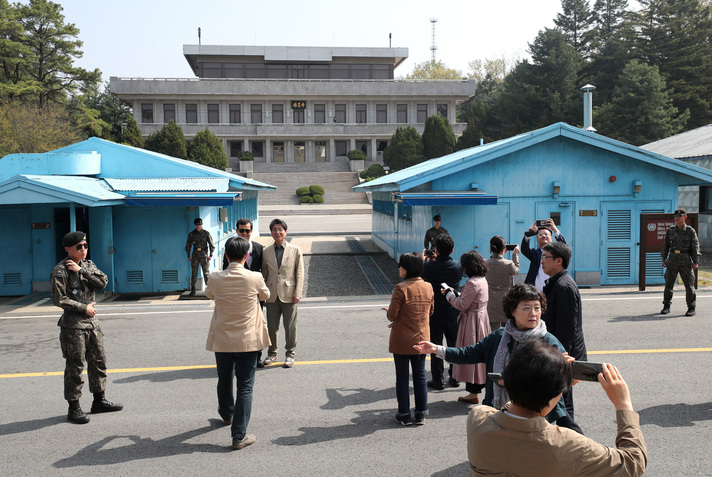Posted on : May.2,2019 15:18 KST
 |
|
Tourists in the newly reopened JSA of Panmunjom take photographs on May 1. (photo pool)
|
The Joint Security Area (JSA) at the truce village of Panmunjom was reopened to civilians on May 1. At the end of October 2018, the area was temporarily closed to the public for six months while it was being demilitarized. Visitors to the newly reopened JSA reported feeling less tension in the air. The soldiers on guard duty, for example, were unarmed, no longer carrying sidearms or wearing bulletproof helmets as they used to do. While it’s a shame that the reopening of the North Korean half of the JSA has been delayed, the disappearance of lethal weapons from the JSA, a symbol of inter-Korean division and conflict, is a tangible result of the series of talks held on and around the Korean Peninsula since last year. We hope that this will be an opportunity for dialogue to resume, ending the recent deadlock on the peninsula.
The absence of dialogue on the Korean Peninsula is becoming protracted. Since the failure of their summit in Hanoi at the end of February, North Korea and the US have been focusing on a battle of nerves, both waiting for the other side to give ground. On Apr. 30, North Korean First Vice Foreign Minister Choe Son-hui openly threatened the US: if it can’t change its calculations by the end of the year, she said, it will face “undesired consequences.” This was tit for tat, given US Secretary of State Mike Pompeo’s previous comment that the US would have to “change paths” if the denuclearization talks fail.
Inter-Korean communication isn’t going very well, either. While the South Korean government has proposed holding inter-Korean talks to discuss ways to restart the North Korea-US denuclearization talks, the North hasn’t agreed to the proposal. The North has also stopped implementing the terms of previous agreements, including joint efforts to exhume remains of soldiers and video reunions for the divided families, and it sat out of a ceremony, which South Korea had to host on its own, marking the first anniversary of the Apr. 27 Panmunjom Declaration. North Korea’s lack of enthusiasm about inter-Korean relations appears to result from its tendency to regard them as playing second fiddle to its relations with the US, as well as its dissatisfaction with the role Seoul has been playing.
But the fact that North Korea-US dialogue has broken down like this is no reason to then halt and neglect inter-Korean dialogue. As the saying goes, the longest way round is the shortest way home. While the denuclearization talks with the US are obviously important to North Korea, inter-Korean dialogue could provide a way around the impasse in those talks. While the North secured diplomatic support from Russia during the summit the two countries held last week, in the North’s first diplomatic move since the Hanoi summit, that by itself probably won’t be enough to engineer a breakthrough. Implementing the inter-Korean agreements and promoting inter-Korean exchange, even inside the framework of the UN sanctions, will also have a positive influence on the North Korea-US negotiations. We hope that North Korea will proactively engage in inter-Korean dialogue before it’s too late.
Please direct comments or questions to [english@hani.co.kr]




